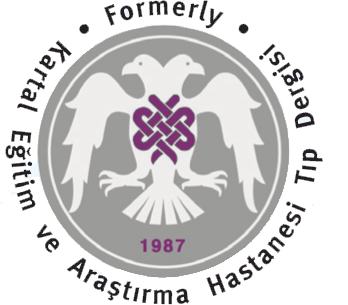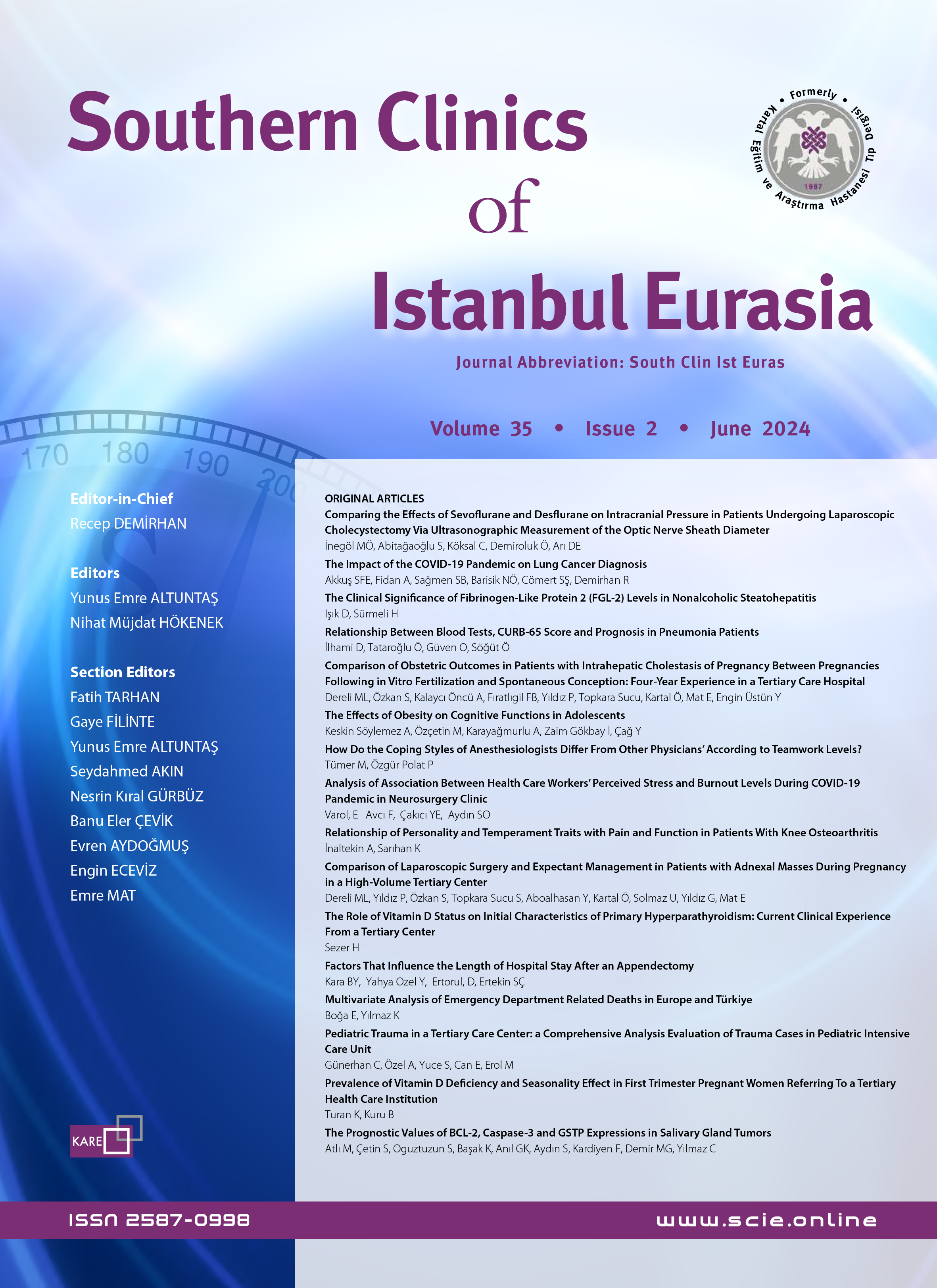Assessment of the Fatigue with Biochemical Data and Corpus Callosum Atrophy in Multiple Sclerosis Patients
Tülin Aktürk1, Hikmet Sacmacı2, Mustafa Erkoç31Department of Neurology, Kartal Dr. Lütfi Kırdar City Hospital, İstanbul, Turkey2Department of Neurology, Yozgat Bozok University Faculty of Medicine, Yozgat, Turkey
3Department of Radiology, Yozgat Bozok University Faculty of Medicine, Yozgat, Turkey
INTRODUCTION: Fatigue is a common finding in patients with multiple sclerosis (MS) and its etiopathogenesis has not been fully elucidated. The aim of this study was to evaluate the relationship between fatigue and biochemical data and corpus callosum index (CCI) in brain magnetic resonance imaging (MRI).
METHODS: In this cross-sectional study, 100 individuals (58 MS patients and 42 control subjects) were included. The disability of the patients was determined with the extended disability status scale (EDSS), and their fatigue was evaluated with the Fatigue Severity Scale (FSS). Biochemical data were analyzed. CCI values were calculated on brain MRI scans.
RESULTS: There was no difference between the groups in terms of age, gender, and BMI (p>0.05). In MS patients, folate level and CCI values were found to be statistically significantly lower compared to the control group (p=0.029 and p<0.001, respectively). It was seen that the triglyceride value was significantly higher in the MS group, and there was no significant difference between the groups in terms of other biochemical data. It was found that there was a positive correlation between fatigue and EDSS, and a negative correlation between the CCI and folate value in the MS group. When MS patients with and without fatigue and the control group were compared,only folate levels were found to differ between the groups (p=0.011).
DISCUSSION AND CONCLUSION: Our results suggest that fatigue in MS patients is associated with corpus callosum atrophy, a higher level of disability, and lower folate levels. Folate replacement therapy may reduce fatigue, even if folate levels are above the lower limit. Confirming these findings with larger patient series will contribute to a better understanding of fatigue in MS disease and the relationship between fatigue and folate.
Multipl Skleroz Hastalarında Yorgunluğun Biyokimyasal Veriler ve Korpus Kallosum Atrofisi İle Değerlendirilmesi
Tülin Aktürk1, Hikmet Sacmacı2, Mustafa Erkoç31Kartal Dr. Lütfi Kırdar Şehir Hastanesi, Nöroloji Anabilim Dalı, İstanbul, Türkiye2Yozgat Bozok Tıp Fakültesi, Nöroloji Anabilim Dalı, Yozgat, Türkiye
3Yozgat Bozok Tıp Fakültesi, Radyoloji Anabilim Dalı, Yozgat, Türkiye
GİRİŞ ve AMAÇ: Multipl skleroz (MS) hastalarında yorgunluk etyopatogenezi tam aydınlatılamamış sık görülen bir bulgudur. Bu çalışmada yorgunluğun
biyokimyasal veriler ve beyin manyetik rezonans (MR) görüntülemede korpus kallosum indeksi (CCI) ile ilişkisinin değerlendirilmesi amaçlanmıştır.
YÖNTEM ve GEREÇLER: Kesitsel özellikte olan bu çalışmaya 58 MS hastası, 42 kontrol olmak üzere 100 kişi dahil edildi. Hastaların özürlülüğü genişletilmiş özürlülük durum ölçeği (EDSS) ile belirlendi ve yorgunlukları Fatigue Severity Scale (FSS) ile değerlendirildi. Biyokimyasal veriler analiz edildi. Beyin MRda CCI değerleri hesaplandı.
BULGULAR: Gruplar arasında yaş, cinsiyet, vücut kitle indeksi açısından farklılık tespit edilmedi (p>0.05). MS hastalarında kontrol grubuna göre folat düzeyi ve CCI değeri istatistiksel olarak anlamlı derecede düşük saptandı (sırasıyla p=0.029 ve p<0.001). MS grubunda trigliserit
değerinin anlamlı derecede yüksek olduğu gözlendi, gruplar arasında diğer biyokimyasal veriler açısından anlamlı farklılık yoktu. MS grubunda yorgunluk ile EDSS arasında pozitif korelasyon, korpus kallosum indeks ve folat değeri arasında ise negatif korelasyon olduğu belirlendi. Yorgunluk ile diğer veriler arasında anlamlı korelasyon saptanmadı. Yorgunluğu olan ve olmayan MS hastaları ve kontrol grubu karşılaştırıldığında ise gruplar arasında sadece folat açısından farklılık olduğu tespit edildi (p=0.011).
TARTIŞMA ve SONUÇ: Sonuçlarımız MS hastalarında yorgunluğun; daha belirgin korpus kallosum atrofisi, daha ileri özürlülük seviyesi ve daha düşük folat düzeyi ile ilişkili olduğunu göstermektedir. MS hastalarında belirlenmiş alt sınırın üstünde bile olsa folat replasmanı yorgunluğu azaltabilir. Bu bulguların daha geniş hasta serileri ile doğrulanması MS hastalığındaki yorgunluğun ve yorgunluk ile folat ilişkisinin daha iyi anlaşılmasına katkı sağlayacaktır.
Manuscript Language: English



















